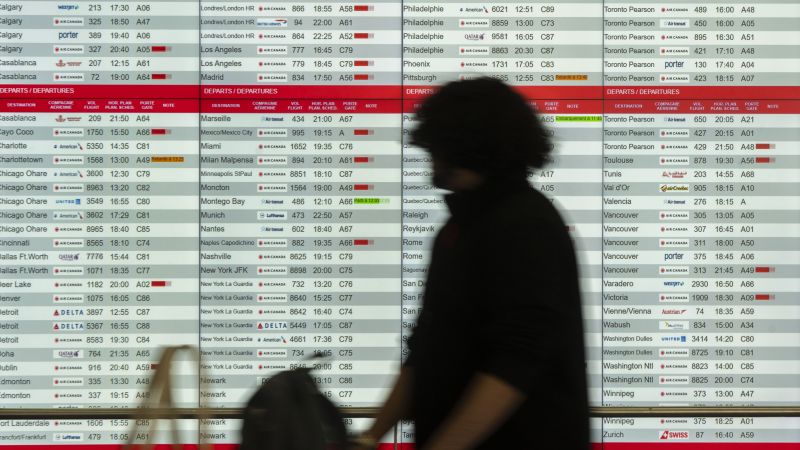The impending strike by Air Canada flight attendants is creating significant turbulence for travelers during the busy summer season. As the airline announced the potential shutdown of operations starting Saturday due to unresolved contract disputes, travelers now find themselves in a precarious situation. Air Canada warned that the strike could lead to the cancellation of nearly all its scheduled flights, which affects a staggering approximately 130,000 passengers daily. The readiness of the airline to suspend services underscores the gravity of the situation, with the already chaotic travel landscape set to worsen should the strike commence as planned.
In anticipation of the potential strike, Air Canada has chosen to temporarily suspend its flight schedule, taking proactive measures to rebook passengers on other airlines to minimize disruptions. Nevertheless, hundreds of flights have already been canceled since Thursday, with the total rising to an estimated 500 by the end of Friday, exacerbating travel uncertainties for thousands who planned to fly during this peak season. The travel sector is often chaotic during the summer months, and these cancellations are just adding to the turmoil many are experiencing as they scramble to find alternate travel arrangements.
The heart of the issue can be traced to the stalled contract negotiations between Air Canada and the union, which represents around 10,000 flight attendants. Central to the discussions are key grievances related to pay raises and other work-related conditions, which have led to a deadlock. The contrasting positions of the flight attendants and the airline indicate deep-rooted issues in the employment agreement that have yet to be resolved after significant negotiation efforts over several months. The airline is now in a position where it must communicate updates to potentially impacted passengers through direct channels like email and text, aiming to keep travelers informed about their flight arrangements.
With escalating tensions, the strike could prompt a complete halt to all Air Canada and Air Canada Rouge flights, although regional flights operated by Jazz Aviation and PAL Airlines would remain unaffected. Air Canada has communicated its operational restoration plans, mentioning that a full return to service may take up to a week, emphasizing the logistical challenges faced by the airline in light of the flight attendant strike. Passengers whose flights are canceled will be eligible for refunds through the airline’s website and app, although the complexities of the situation mean that immediate rebooking options with other carriers may not be readily available due to already full flights.
Should passengers need to reschedule, Air Canada has indicated that those with flexible travel plans would be allowed to rebook their flights for selected dates without incurring additional charges. Federal regulations state that cancellations caused by strikes are considered beyond the airline’s control, meaning that affected customers are not eligible for ancillary compensation for expenses such as lodging and meals.
Furthermore, the impact of Air Canada’s operational disruptions extends internationally, with the carrier servicing over 85 airports globally and conducting 430 daily flights, particularly between Canada and the U.S. As a member of the Star Alliance, Air Canada’s cancellations have ripple effects felt by its partners. United Airlines, in particular, has stepped in to assist by waiving fees for passengers needing to book alternate travel, a move that highlights the interconnected nature of the airline industry.
The contract negotiations have been ongoing for about eight months, with the union recently voting overwhelmingly in favor of a strike if an agreement cannot be reached. When the union provided a strike notice, Air Canada retaliated with its own lockout notice, a move that indicates heightened tensions between the two parties. Negotiations have reportedly been viewed as unsuccessful, with both sides still divided on critical issues regarding pay and other compensations.
As the countdown to the potential strike ticks down, an urgency permeates the air, with both flight attendants and the airline realizing that some middle ground must be reached. The union firmly rejected an arbitration proposal from Air Canada, preferring direct negotiations with elements that reflect the workers’ needs. The question remains whether the two sides can bridge their disagreements to avert the collapse of operations or if this labor dispute will ultimately culminate in significant disruption for travelers. With the situation rapidly evolving, passengers are advised to stay alert about their travel plans and the developing labor situation.












